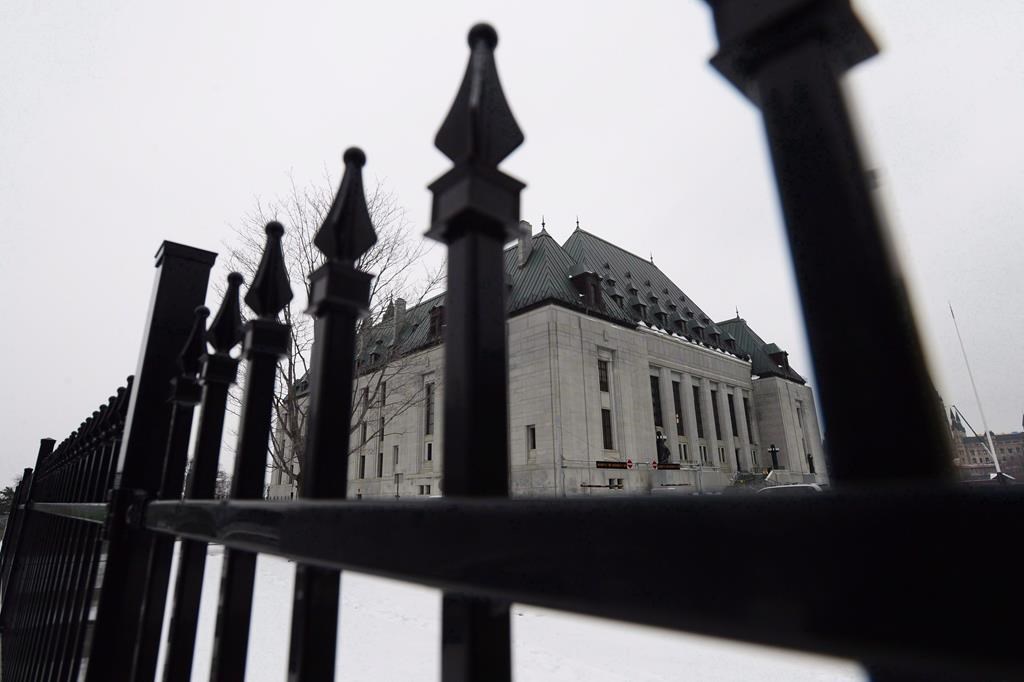The Supreme Court of Canada has ruled that criminal cases involving a young person must be completed within 18 months — or 30 months for complex cases — and that there is no need for a shorter time frame.

In a 5-4 decision, Canada’s highest court found that criminal cases involving people under the age of 18 must follow the 2016 landmark Jordan decision, in which the Supreme Court ruled that criminal cases can be thrown out for unreasonable delays if they exceed the deadlines of 18 months for provincial court cases and 30 months for superior court cases.
“The enhanced need for timeliness in youth matters can and should be taken into account when determining whether delay falling below the presumptive ceiling is unreasonable,” Supreme Court Justice Michael Moldaver wrote for the majority. “In this way, the existing Jordan framework is capable of accommodating the enhanced need for timeliness in youth cases.”
READ MORE: Nearly 800 criminal cases thrown out over delays since 2016 Jordan decision

The landmark decision hinged on the case of an Alberta teen, identified only as “K.J.M.” in court documents, who was charged with aggravated assault after he stabbed another teen with a box cutter at a house party in 2015.
Although K.J.M. did not deny harming the victim, he claimed he acted in self-defence. When K.J.M. was first charged in April 2015, he was 15 years old. He was almost 17 years old by the time the trial concluded in November 2016, when he was found guilty of aggravated assault and possession of a dangerous weapon.
The Supreme Court ruled that although K.J.M’s trial exceeded the 18-month threshold some of the delays attributable to the defence and the appeal was dismissed.
The Jordan decision

Get daily National news
The Jordan decision left provinces scrambling to meet the new deadlines in adult criminal cases and led to an increase in cases being tossed from court due to excessive delays.
A Global News investigation last June found that nearly 800 adult criminal cases — ranging from manslaughter to drug trafficking and even murder — have been stayed because a judge found the defendant’s constitutional right to a timely trial had been violated.
READ MORE: Almost half of Edmonton criminal cases ultimately withdrawn

What effect today’s ruling will have is unclear.
In 2017-18, there were 2,767 criminal cases in youth courts in Canada that took more than a year to resolve, according to Statistics Canada. In the same year, StatCan data shows that of 27,487 cases, almost half, or 12,928, were stayed or withdrawn. The data includes some court referrals to alternative or extrajudicial measures and restorative justice programs.
No need for lower time limits
The majority opinion wrote that there is “no evidence” that the youth criminal justice system is facing the problem of delays as adult courts that would require creating shorter time limits.
“There is no evidence that young persons who proactively request an expedited trial are not being accommodated in the post‑Jordan world, nor that actors within the youth criminal justice system are not taking Jordan to heart,” Moldaver wrote.
“Unless and until it can be shown that Jordan is failing to adequately serve Canada’s youth and society’s broader interest in seeing youth matters tried expeditiously, there is in my view no need to consider, much less implement, a lower constitutional ceiling for youth matters.”
Meanwhile, three justices argued a time limit of 15 months would be more appropriate as young persons suffer a “distinct prejudice” from court delays.
“Doing so gives effect to Parliament’s intention in enacting a separate youth criminal justice system, to Canada’s international commitments, to the recognition in pre-Jordan case law that youth proceedings must be expeditious,” Justices Rosie Abella and Russell Brown wrote in a dissenting opinion shared by Sheilah Martin.
“Just as the court in Jordan determined the appropriate ceiling for adult proceedings, a separate analysis is required for youth proceedings.”
READ MORE: Alberta to hire 35 Crown prosecutors, 30 support staff to deal with court backlog
Mary Birdsell, executive director of the advocacy organization Justice For Children and Youth, said she was “disappointed” with the ruling, saying the lengthy delays in a criminal case can be particularly devastating for young people, damaging their education or future employment prospects.
“A year is a really long time in a teenager’s life, and their worlds may have changed significantly in that period of time,” said Birdsell. “And their moral development will have changed in that time.”
Birdsell, who was a intervenor in the case, said that longer delays in a youth trial create a disconnect when addressing the underlying issue in a crime. Her organization advocated for lower time limits.
“In order to protect the public, we have to have meaningful consequences,” she said. “And meaningful consequences are timely consequences.”
Lawyer Graham Johnson, who represented K.J.M.’s case, argued that there is “heightened significance” when dealing with minors and argued for a 12-month ceiling on court proceedings.
“The exacerbated prejudice young persons experience as a result of delay, and the legal importance of promptness, add additional layers to these considerations,” Johnson wrote in a legal filing to the Supreme Court. “These heightened aspects of prejudice were not considered or incorporated in the setting of the Jordan ceiling in the context of the facts before that court.”
Both the governments of Alberta and Ontario — which were intervenors in the case — argued that a lower time frame for youth cases would be “unnecessary and unrealistic.”
- High blood pressure drug recalled over low blood pressure pill mix-up
- ‘Doesn’t make sense’: Union files labour complaint over federal 4-day in-office mandate
- Canadian Tire ordered to pay nearly $1.3 million for false advertising
- Ottawa gives Canada Post a $1.01-billion loan amid ongoing financial struggles








Comments